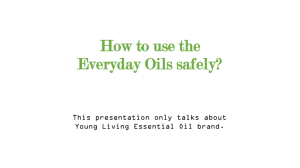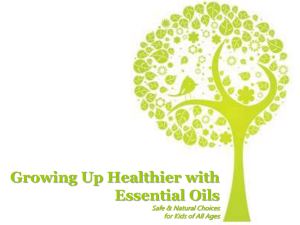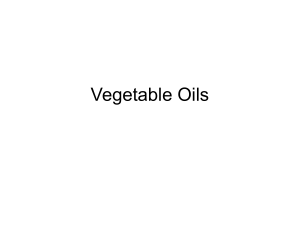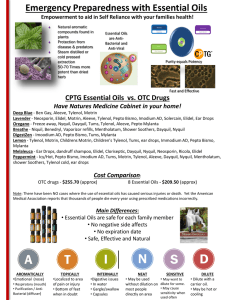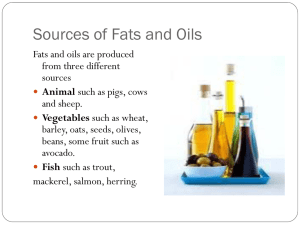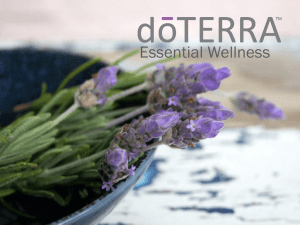Safe Use of Oils
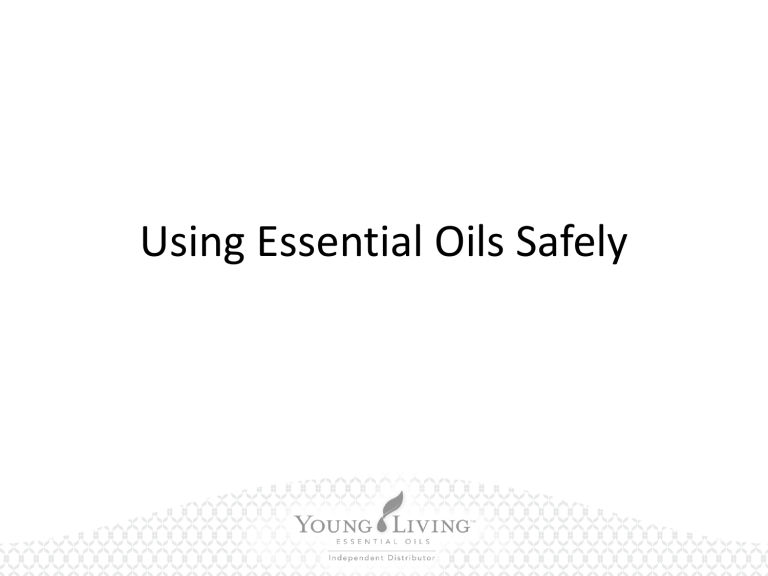
Using Essential Oils Safely
Using Essential Oils
• I’m new to essential oils. How are they used?
– Each bottle of Young Living essential oil is labeled with directions for how that oil can be used, and these directions vary based on location.
– Please consult with the product label for appropriate use directions.
Carrier Oils
• I see the term “carrier oil” used in several places. What is a carrier oil, what does it do, and why should I use it?
– A vegetable oil such as coconut oil or grapeseed oil that can be used to dilute EO
– YL V-6 Vegetable Oil Complex is an excellent carrier oil for all applications
Carrier Oils
• I see the term “carrier oil” used in several places. What is a carrier oil, what does it do, and why should I use it?
– Carrier oils ensure that EOs applied topically are comfortable, and prevents waste due to excessive application
– Vegetable shortening, butter, margarine or petroleum derivatives (petrolatum jelly) should not be used
Hot Oils
• What is a hot oil?
– “Hot oils” are oils that, when applied to the skin, can cause a hot or burning sensation.
– Examples of “hot” oils include cinnamon, clove, lemongrass, peppermint, oregano, thyme, Exodus
II, and Thieves
– YL recommends using a patch test procedure prior to first use
Patch Test
• Apply 1-2 drops of EO to a the forearm.
• Observe for 1-2 hours
• Usually reactions occur within 5-10 minutes.
• If you experience a hot or burning sensation or if you develop a rash, add
V-6 carrier oil to the affected area as often as needed
Adverse Reactions
• What if I experience skin discomfort or irritation?
– If discomfort or irritation occurs, stop using the
EO, and apply V-6 or other carrier oil to the affected area
– Before using the EO again, perform a patch test and dilute with carrier oil
Adverse Reactions
• What if I experience skin discomfort or irritation
Never use water to flush the oil off the skin, as this may increase discomfort. If EO gets in your eye, flush with V-6 carrier oil to alleviate discomfort. If discomfort does not subside within
5 minutes, seek medical attention
Adverse Reactions
• If a rash occurs this may be a sign of detoxification; drink adequate water to encourage the release and removal of body toxins
• Toxins present in petrochemical based soaps and skin care products, detergents and perfumes may trigger some of the detoxification reactions. Consider discontinuation of these agents if a reaction occurs
Where to Apply
• Can essential oils be applied to sensitive areas?
– Avoid contact with sensitive areas such as eyes, ears, genitals and mucous membranes.
– If you choose to use the oil in any sensitive area, dilute 1 drop of the essential oil to 5-10 drops of
V-6 carrier oil
Frequency of Use
• How often can essential oils be applied? How much do I use?
– Proper usage is indicated on each EO label. Please follow instructions
– Essential oils are potent– start low and go slow. In most cases 1-2 drops are adequate; using more may waste product
– Excessive use of essential oils may increase the risk for adverse reactions
Special Populations
• Can essential oils be used during pregnancy or while nursing?
– It is strongly recommended that, prior to use of essential oils, you seek the advice and recommendation of a competent, trained health care advisor who is experienced in EO usage
– It is generally recommended to avoid overuse and excessive use of Clary Sage, Sage, Idaho Tansy,
Hyssop, Fennel, and Wintergreen as well as the blends and supplements that contain these oils
Special Populations
• Can essential oils be used on children?
– Many EOs are appropriate for use with children, and they should be diluted prior to use
– Some YL products are pre-diluted with carrier oil as indicated on product label and are intended for direct application on children
Sun Sensitivity
• How does exposure to sun affect essential oil use?
– Some EOs, especially citrus oils, contain natural molecules that react with sunlight and cause a sensitivity reaction
– All YL EOs and oil blends that contain these compounds are labeled with a warning to avoid sun/UV light for 12 to 48 hours after applying
Sun Sensitivity
• How does exposure to sun affect essential oil use?
– Dilute and apply the oil to skin that is protected from sun/UV exposure to reduce the risk of sensitivity
– YL beauty and cosmetic products are formulated to remove sun-sensitizing agents to reduce the risk of sun sensitivity
Medical Conditions
• What about the use of essential oils if I have a medical condition? Can essential oils interact with prescription medications?
– If you have a disease or medical condition, or if you are using a prescription medication, it is recommended that you consult with a health advisor who has experience with EOs
– Seek advice of a physician and pharmacist about interactions
